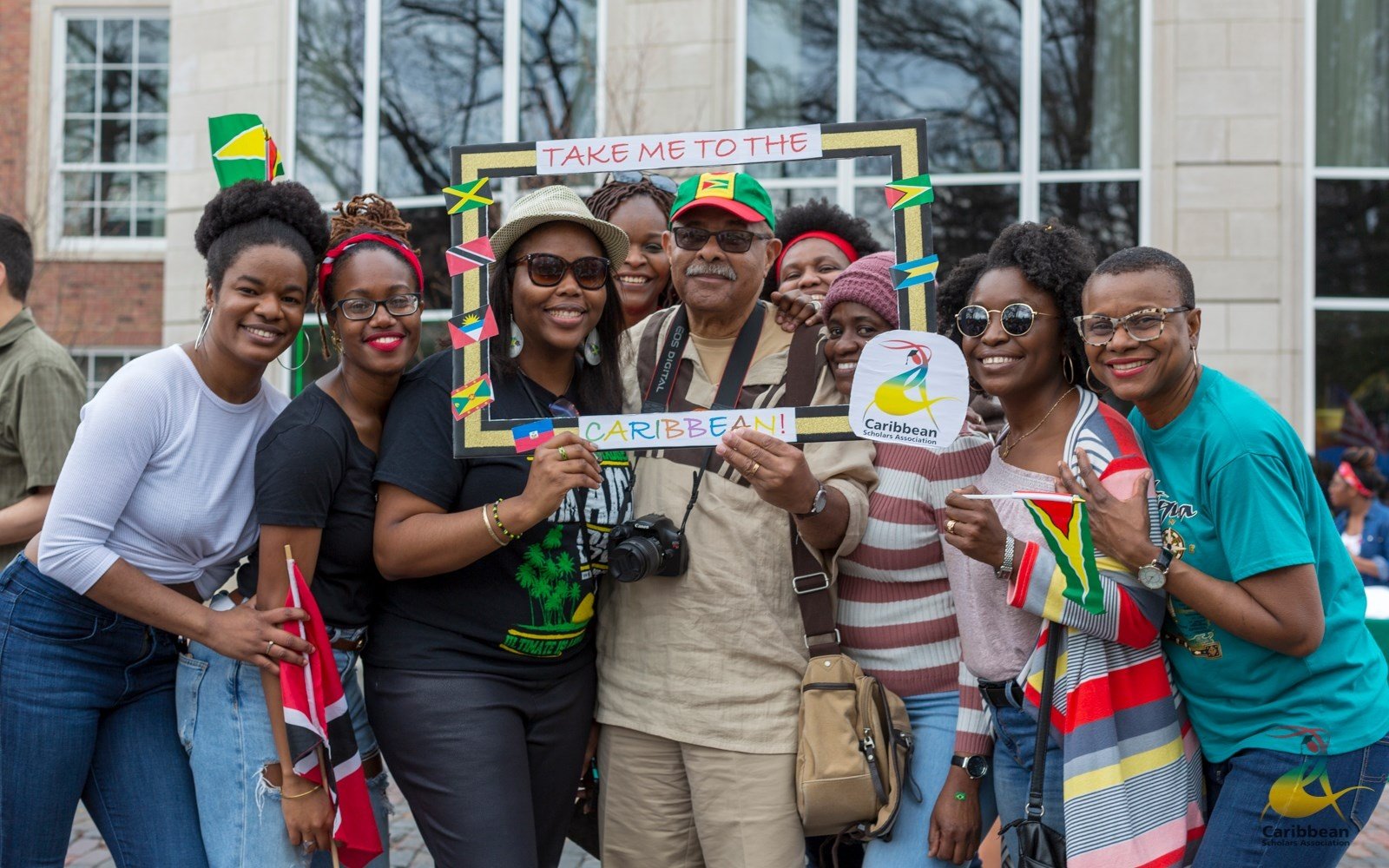Kindred from the Caribbean
Story by Caroline Bissonnette
Photos by Aziz Al Fadha
Despite OU’s long history of working with Caribbean countries, inconsistent enrollment of Caribbean students leaves an island of emptiness in the hearts of the few who are here.
CSA members pose with Dr. Vibert Cambridge at OU's annual Street Fair.
The presence of Caribbean culture at Ohio University has seen decades of fluctuation. Despite OU’s tendency to leave the islands on the backburner, the importance of embracing Caribbean students and encouraging Caribbean recruitment is not as variable.
For years, the Caribbean has welcomed OU faculty and students for various events or study abroad programs and more. Despite this institutional connection, Caribbean students still struggle to find a place to call their own in a sea of Ohioans and other international students.
The late 1980s brought a strong wave of Caribbean students to Athens that encouraged the creation of the Caribbean Scholars Association (CSA). The organization's goal was to celebrate Caribbean culture in Athens and keep it alive on campus. Throughout the years, the cyclical nature of a Caribbean presence at OU has rendered the activity of the organization inconsistent.
Dr. Vibert Cambridge, a proud OU alumnus and professor of international communications, is originally from Guyana. Since he arrived at OU in the late 1980s, he has always been a strong advocate for expanding and showcasing Caribbean culture on campus.
Cambridge was an original member of CSA and says the Caribbean students at OU would join forces with those at Hocking College to plan celebrations and events together.
“In those days, jerk chicken was very popular among Caribbean people, but the seasoning didn’t exist here as a product,” Cambridge says. “So, the students from Hocking College would come, make the jerk seasoning and then we would have the barbecues all together.”
The spirit of the Caribbean thrived in Athens following the creation of CSA. Caribbean students at OU and Hocking College had a place to go and get a taste of home, even though they were over a thousand miles away.
“It was in that space one got to understand a little bit more, not only about the Caribbean, but its place in the academy,” Cambridge says. The existence of an organization that is solely there to promote culture and tradition added light to Athens that those of Caribbean descent hadn’t previously seen.
As years went on, the number of Caribbean students on campus fluctuated and the activity of CSA rode the wave. When there were more Caribbean students, there would naturally be more activity within the organization. Eventually, the numbers sank low enough that CSA ceased activity.
During the 2019-2020 school year, before the coronavirus pandemic began, Anna-Kaye Rowe, a Ph.D. student from Jamaica, helped to revive the organization as its president. As a Caribbean student, Rowe is passionate about sharing her culture and encouraging other Caribbean students to come together.
With the support of the CSA executives and their advisor Marian Carr, the organization was able to plan several activities which brought together not just Caribbean students, but any OU students from diverse backgrounds.
Caribbean students celebrate together at OU's club fair.
“Seeing people at OU getting a glimpse and taste of our culture and traditions was really heartwarming,” Rowe says. “All of our events were well-supported, and we were very strategic in planning fun and creative activities, because togetherness and excitement are core features of our Caribbean culture; we want other people to feel the excitement that we do when we are all together.”
Unfortunately, the coronavirus spread rapidly in Spring 2020, prohibiting further in-person events. However, due to the success to which Rowe and her team led the organization, CSA was named Best Overall Organization for the 2019-2020 school year by the International Student Union’s Executive Team.
Despite the synergy on campus and being recognized, CSA was only revived for that one year.
“I had to take a step back. While it was a fulfilling experience, it can become time consuming and because of our low numbers, it wasn’t possible for us to continue without more support,” Rowe says. “That one year was incredible and I was so sad we could not build on that momentum, but that’s part of the dilemma. We want to have a more sustained presence on campus, but a steady flow of Caribbean students is needed.”
The inactivity of the group does not mean that there aren’t any Caribbean students left at OU. There are still international students who find sanctuary at OU, and without CSA, it may be difficult for a lot of them to find people that make Ohio feel more like home. This is largely due to the university’s lack of recruitment in the Caribbean.
The Caribbean students that were and are currently on campus have mostly only heard about OU through other Caribbean people. The recruitment of students (particularly among graduate students) and faculty in the Caribbean relies mainly on word-of-mouth.
“OU has centralized and strategized its recruitment,” Cambridge says. “In the last two years, the largest amount of new oil has come from Guyana. The country is beginning to invest heavily in graduate education — is OU at that door?”
Cambridge says that it is in OU’s best interest to “strategically engage the Caribbean” if it hopes to “maintain its status and continue to pioneer as a leading international university.”
CSA members wave their flags proudly during OU's annual Street Fair.
OU needs someone to champion Caribbean engagement, according to Cambridge.
“Champions do not necessarily have to be of direct ancestry,” Cambridge says. Regardless of Caribbean descent, students and faculty can push for the exposure of Caribbean culture.
Having other people on campus also from the Caribbean encourages a feeling of belonging within these students and will further encourage them to share their experience with their friends back in the Caribbean.
“It can be hard to be away from home, but when we get together or see each other on campus, it just fills your cup when you’re on empty,” Rowe says. “We just need the university to see our part of the world as being valuable.”



